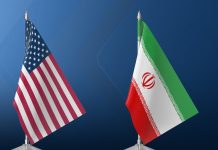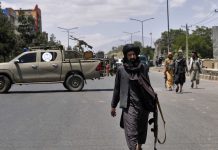From John Nelson
KABUL: The Afghan Foreign Ministry announced on Tuesday that the Taliban administration’s Foreign Minister Amir Khan Mutaqqi was scheduled to visit Pakistan by the end of this week. However, the date of the visit was not specified in the statement.
“The foreign minister of the Islamic Emirate Afghanistan Maulvi Amir Khan Mutaqqi is scheduled to visit Islamabad by the end of the current week. He will lead a comprehensive political and business delegation,” a foreign ministry statement said. Afghan Foreign Ministry deputy spokesman Hafiz Zia Takkal posted the statement in Pashto on his official Twitter account.
“The Afghan government wants to hold comprehensive bilateral talks on political, Pakistan-Afghanistan economic relations, regional stability and transit,” the statement further said.
Muttaqi will represent Afghanistan in a trilateral meeting with the foreign ministers of Pakistan and China. It will be the sixth such trilateral meeting.
Aside from participating in the trilateral meeting, Mutaqqi will also engage in bilateral talks with his Chinese counterpart during the visit.
This will be his second visit to Pakistan since the Taliban took control of Kabul on August 15, 2021, with his last visit to Islamabad taking place in November of the same year. As of now, Pakistan has not commented on the upcoming visit.
While the Afghan foreign ministry has listed certain issues which will be discussed during the upcoming talks with Pakistan, there may be other issues that Pakistan wants to address as well.
One such issue is Pakistan’s desire for Kabul to take action against the proscribed Tehreek-i-Taliban Pakistan (TTP), which Pakistani officials say operates from Afghan territory. However, the Taliban government in Afghanistan denies these assertions. In February, a high-level Pakistani delegation, led by Defence Minister Khawaja Asif, travelled to Kabul to discuss the TTP issue.
Another issue that Pakistan is likely to raise is the activities of the Islamic State’s Khorasan group in Afghanistan.
In December of the previous year, this group claimed responsibility for the attack on Pakistani charge d’affaires, Ubaidur Rehman Nizamani.
In addition to these security-related matters, trade relations and transit issues will also likely be discussed during the talks. The Afghan foreign ministry statement has already highlighted the importance of such discussions.
Notably, Afghanistan’s exports have increased during the Taliban government, primarily due to the import of coal and vegetables following last year’s devastating floods that destroyed crops.
On Monday, a UN Security Council committee agreed to allow Muttaqi to travel to Pakistan from Afghanistan to meet with the foreign ministers of Pakistan and China, diplomats said.
Muttaqi has long been subjected to a travel ban, asset freeze and arms embargo under Security Council sanctions.
According to a letter to the 15-member Security Council, Taliban sanctions committee, Pakistan’s UN mission requested an exemption for Muttaqi, who was to travel between May 6-9 “for a meeting with the foreign ministers of Pakistan and China”. It did not say what the ministers would discuss. It said Pakistan would cover all costs associated with Muttaqi’s trip.
Chinese and Pakistani officials have both said in the past that they would welcome Taliban-led Afghanistan into the multibillion-dollar China-Pakistan Economic Corridor (CPEC) infrastructure project, part of the Belt and Road Initiative.
Afghanistan sits as a key geographical trade and transit route between South and Central Asia and has billions of dollars of untapped mineral resources. The Taliban seized power in August 2021 as US-led forces withdrew after 20 years of war.
The Security Council committee allowed Muttaqi to travel to Uzbekistan last month for a meeting of the foreign ministers of neighbouring countries of Afghanistan to discuss urgent peace, security, and stability matters.
UN Secretary-General Antonio Guterres began a two-day meeting on Monday in Doha with special envoys on Afghanistan from various countries that aims “to achieve a common understanding within the international community on how to engage with the Taliban,” UN spokesman Stephane Dujarric said.
Dujarric said the closed-door meeting would discuss key issues, such as human rights — in particular women’s and girls’ rights — inclusive governance, countering terrorism and drug trafficking.
Taking part are China, France, Germany, India, Indonesia, Iran, Japan, Kazakhstan, Kyrgyzstan, Norway, Pakistan, Qatar, Russia, Saudi Arabia, Tajikistan, Turkey, Turkmenistan, United Arab Emirates, Britain, the United States, Uzbekistan, the European Union and the Organisation of Islamic Cooperation. The Taliban administration was not invited to the Doha meeting.






